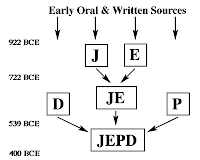Deirdre Good shared a link to an article about memory research, and mentions its relevance to (among other things) the ending of Mark’s Gospel.
Despite my avid interest in that subject, the first thing that came to my mind was the subject of a class I taught today: the Documentary Hypothesis. On the one hand, everything we know about the production of ancient texts makes me resist the Documentary Hypothesis – the idea of an author copying a few lines from here and a few lines from there just seems so at odds with what we know about writing and authorship in the ancient world. On the other hand, the fact that we regularly have details that are difficult to reconcile and impede comprehension of the narrative, which can frequently be pulled apart into separate coherent narratives, seems to connect with the article Deirdre linked to, which suggests that our memories tend to smooth over awkward details and non sequiturs. If the Pentateuch were derived from oral traditions rather than written ones, wouldn’t we expect the effects of memory to smooth over some of these rough edges? Might such work on memory lend support to the scenario the Documentary Hypothesis envisages, in spite of our lack of parallels for such a compositional procedure?
As always I would particularly value comments from friends and colleagues who work primarily on Hebrew Bible/Old Testament!













